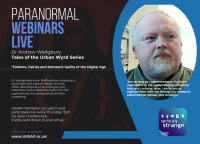Ghosts of the Urban Wyrd Series continues

Join us, Dr Andrew Wedgbury continues his excellent Ghosts of the Urban Wyrd Series this week
Dr Wedge hails from Staffordshire University, a sociologist and a game design lecturer. Often described as a Hauntologist, and researcher with a deep fascination for the supernatural, the unexplained, and the unsettling. "For as long as I can remember, I’ve been captivated by the hidden realms of human fear and curiosity. Now, I invite you to explore them with me through my research, experimental games, and writings." Member of the Hauntological society and the Recreational Fear Lab in Denmark. Andrew has presented twice to ASSAP, the links to those presentations and conversations are posted below. Would highly recommend diving in!
https://youtu.be/TjzDU7wE90M?si=U2fxRP8ba-GuL_Ip
In this episode, we explore how interactive games can recreate haunted environments for scientific curiosity or thrilling experiences. Dr. Wedge shares insights on crafting digital spaces that evoke the paranormal, drawing on his expertise in anthropology and hauntology. Explore how ghostly "memes" like #slenderman remain "alive" through retellings and sharing, preserving intangible cultural heritage in digital spaces.
https://youtu.be/IczBB7u-hLY?si=5lR5HaE-y-SWq9M_
This zero-player program, inspired by Ouija boards and EVP, generates random words and alchemical symbols, creating a haunting digital ritual. Is it a game, an experiment, or a portal to the spirit world? Download SpectraDOS and interpret its uncanny messages yourself! I often have SpectraDOS running when I'm working at the PC. Provides some interesting insights, in much the way one could interpret tarot or a potential reading.
https://drwedge.uk/spectrados-a-system-that-watches-back/
"SpectraDOS is now available for public download… a self-running artifact designed to resemble a decaying terminal interface, flickering with noise, fragments, and sometimes… something else. It does not accept input. It does not request action. It simply runs. And those who observe it for long enough may begin to notice patterns where there should be none.
It may be tempting to ask: What does it do?
A better question might be: What does it want you to notice?"
Author :Kristian
Other Blog Entries
ASSAP Library Book Auction (Members Only)
28/01/2026
Exciting Changes to ASSAP Investigator Training – New Unified Programme from January 2026!
30/11/2025
Broad Haven Triangle Training Weekender: Mission Accomplished!
26/11/2025
Ghosts of the Urban Wyrd Series continues
03/11/2025
Seasonal Special Presentations continue
22/10/2025
Off to the Printers! Seriously Strange 163
22/10/2025
Celebrating a milestone, 1,000 YouTube Subscribers
26/07/2025
Dr Paul Rogers to present on the Dodleston Messages
15/07/2025
On the drawing board! From Issue 162
11/05/2025
Seriously Strange Podcast
11/05/2025